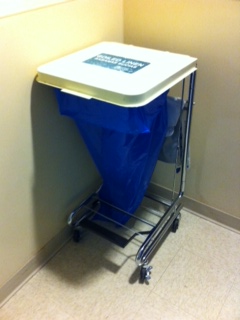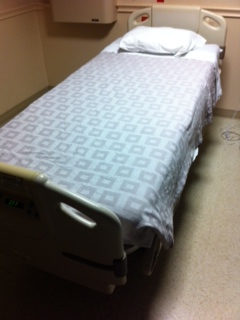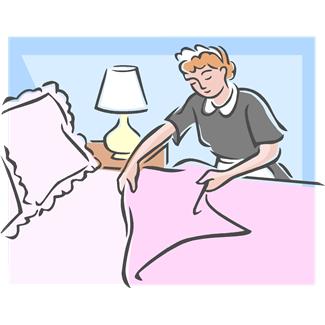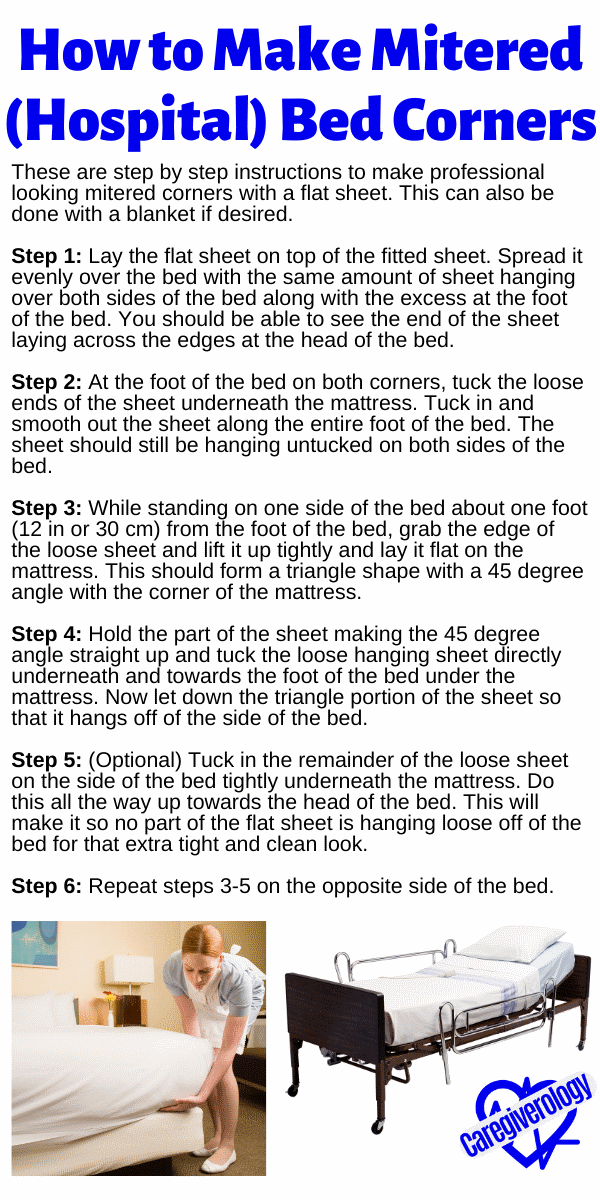How to Change Linens in an Occupied Bed
You should change your patient's bed linens often. If they are on bedrest, I usually change them while giving them a bed bath. But wait, won't that mean you'll have to change them while the patient is in the bed? Relax, it's much easier than it sounds.
Supplies Occupied bed Mitered corners Finish Pin
 Dirty linen bin
Dirty linen binSupplies
You will need:
- a fitted sheet
- a flat sheet
- a blanket
- an incontinence pad
- one pillowcase, sometimes more depending on the patient
- a dirty linen bin
Changing an Occupied Bed
Of course changing bed linens when nobody is in the bed is easy, but changing an occupied bed is a little different but at the same time almost just as easy if you know how.
First, if the bed is adjustable, flatten it out all the way. Then raise it up high enough to where you won't hurt your back.
Then take the sheet and blanket off the patient and throw them into the dirty linen bin. Depending on the size of the bed and the patient, sometimes you can start changing the bed linens without them even moving. For other patients, you have to wait until they are turned onto their side.
Once the patient is on their side, you should undo the old fitted sheet at both ends on the opposite side of where the patient is facing. Then you should tuck the old bed linens as far underneath them as possible without hurting them of course.
Then put the clean fitted sheet on the bare corners. Just make sure you don't have it sideways and tuck the rest of it underneath the old fitted sheet.
Then grab the incontinence pad and roll it up about halfway on one end. Place it down on the new fitted sheet and tuck it under the old fitted sheet as well. The top should be placed just slightly above the hips while the bottom goes down to the legs. You should aim for it to be placed evenly on both sides of the patient.

If needed, now would be the perfect time to put barrier cream on the patient or place an adult diaper against their bottom.
After everything is in place, have the patient roll back onto their back and to the other side. Just warn them of the "hump" underneath them from the bed linens.
When they are on their side at the opposite end, you should be able to undo the rest of the old fitted sheet and toss it into the dirty linen bin. Then the new fitted sheet should be visible. Grab it and stretch it to the remaining bare corners and unroll the rest of the incontinence pad and/or adult diaper.
Make sure there are no wrinkles in the fitted sheet or the pad. This will irritate their skin and make them uncomfortable. After that, the patient should be able to roll back onto their back.
Then you can grab their pillow or pillows and change their cases. The easiest way to do this is to squeeze the sides of the pillow together with one hand and an open pillowcase with the other. Then just slide the pillow inside. It may take some practice but it's better than using your chin. Then put the pillows back and reposition the patient if needed.
Ask the patient if they want just a sheet, or a sheet and blanket to cover up with. If they don't want a blanket, just put it at the foot of the bed or close by in case they get cold later. It's better to unfold them rather than shake and fling them over the patient. It's just better manners and doesn't give off an unwanted breeze.
How to Make Mitered (Hospital) Bed Corners
These are step by step instructions to make professional looking mitered corners with a flat sheet. This can also be done with a blanket if desired.
Step 1: Lay the flat sheet on top of the fitted sheet. Spread it evenly over the bed with the same amount of sheet hanging over both sides of the bed along with the excess at the foot of the bed. You should be able to see the end of the sheet laying across the edges at the head of the bed.
Step 2: At the foot of the bed on both corners, tuck the loose ends of the sheet underneath the mattress. Tuck in and smooth out the sheet along the entire foot of the bed. The sheet should still be hanging untucked on both sides of the bed.
Step 3: While standing on one side of the bed about one foot (12 in or 30 cm) from the foot of the bed, grab the edge of the loose sheet and lift it up tightly and lay it flat on the mattress. This should form a triangle shape with a 45 degree angle with the corner of the mattress.
Step 4: Hold the part of the sheet making the 45 degree angle straight up and tuck the loose hanging sheet directly underneath and towards the foot of the bed under the mattress. Now let down the triangle portion of the sheet so that it hangs off of the side of the bed.
Step 5: (Optional) Tuck in the remainder of the loose sheet on the side of the bed tightly underneath the mattress. Do this all the way up towards the head of the bed. This will make it so no part of the flat sheet is hanging loose off of the bed for that extra tight and clean look.
Step 6: Repeat steps 3-5 on the opposite side of the bed.
Still confused? Click here for a video demonstrating this process.

Finishing Up
If you are in a hospital or similar facility, then you should of course make sure the patient has their call light. And if the bed is adjustable, make sure you lower the bed back down and adjust it to their liking. Above all else, make sure they are comfortable.
That's it, you have just changed a patient's bed linens without them ever stepping out of the bed. I don't know about you but I was actually pretty shocked at how easy this process was when I first found out about it. With very little practice, it can almost be done without even thinking. It's that simple.
Pin this page!
Medical References for Caregivers
From How to Change Linens in an Occupied Bed to Home
Recent Articles
-
Common Truck Crash Injuries and Legal Remedies - Caregiverology
Jul 19, 25 10:49 AM
Known for its sun-drenched beaches, vibrant arts scene, and bustling maritime industry, Fort Lauderdale is a city that sees heavy traffic both on its roads and at its busy port. Unfortunately, with th… -
Why Expert Legal Help Matters After Serious Injury - Caregiverology
Jul 19, 25 10:35 AM
In Houston, over 67,600 car crashes occurred in 2023, resulting in 290 fatalities and 1,612 serious injuries. That’s roughly 185 accidents every day. -
How Life Care Planners Support Injury Recovery - Caregiverology
Jul 19, 25 10:18 AM
In Los Angeles, life care planners play a vital role in supporting injury recovery, especially for individuals facing catastrophic injuries such as traumatic brain injuries or spinal cord damage.






New! Comments
Have something to say about what you just read? Leave a comment in the box below.